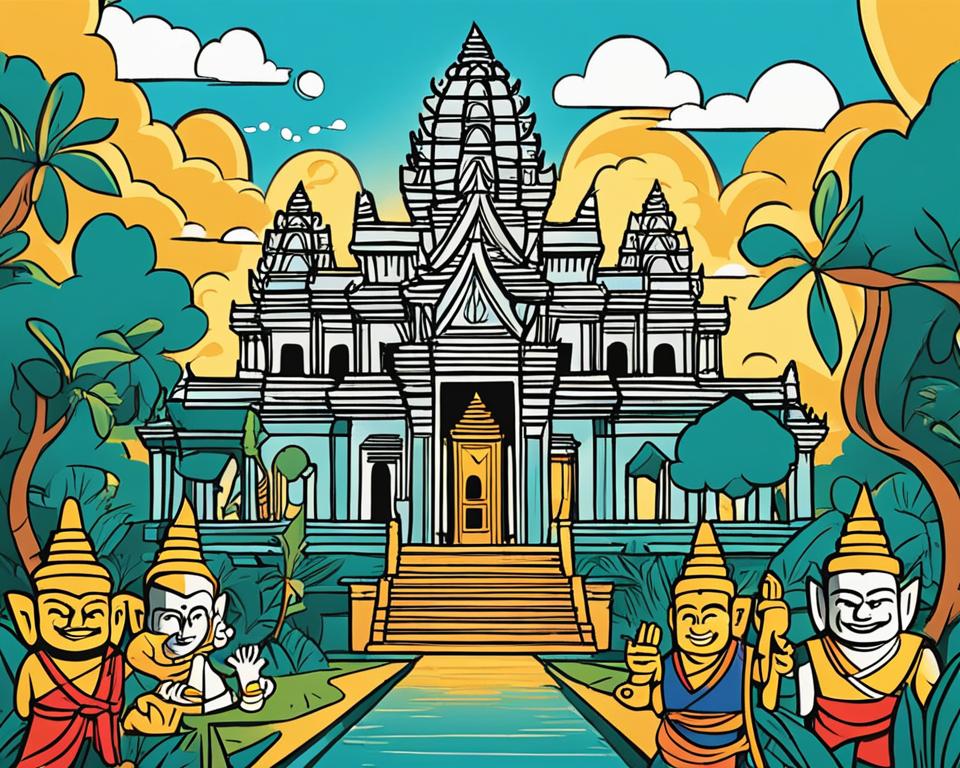Are you looking to discover Cambodia’s rich history and culture through the power of film? Look no further than this curated list of movies about Cambodia. From gripping dramas to eye-opening documentaries, these films offer a diverse range of perspectives on the country’s past and its people. Whether you’re interested in exploring the Cambodian genocide, the struggle for survival during the Khmer Rouge regime, or simply want to experience Cambodian cinema, this list has got you covered.
Khmer Films have long been a significant part of Cambodian Cinema, often delving into the country’s tumultuous past and providing poignant insights into important events. With this list, you can immerse yourself in Cambodian history, learn about the Cambodian Genocide, and gain a deeper understanding of this beautiful nation.
Key Takeaways
- Discover the rich history and culture of Cambodia through film
- Explore important events such as the Cambodian Genocide
- Get a glimpse into Khmer Films and Cambodian Cinema
- Experience powerful dramas and thought-provoking documentaries
- Learn about the struggle for survival during the Khmer Rouge regime
Table of Contents
The Killing Fields (1984)
Overview
“The Killing Fields” is a critically acclaimed movie that delves into the harrowing reality of Cambodia during Pol Pot’s regime and the Khmer Rouge. Released in 1984 and directed by Roland Joffé, the film offers a powerful portrayal of the Cambodian genocide and the struggle for survival during one of the darkest chapters in human history.
The protagonist is Sydney Schanberg, a journalist covering the escalating conflict in Cambodia. As the Khmer Rouge takes control, Schanberg’s Cambodian friend, Dith Pran, faces unimaginable horrors. The movie follows their intertwined journey as they fight against all odds to escape the country and expose the truth of the atrocities committed by the regime.
A Glimpse into the Cambodian Genocide
Through its compelling narrative, “The Killing Fields” helps shed light on the Cambodian genocide and the immense human suffering inflicted by the Khmer Rouge. The film humanizes the overwhelming numbers of lives lost during the “Year Zero” cleansing campaign, providing a deeply personal and emotional perspective on the tragedy.
By highlighting the friendship between Schanberg and Pran, the movie explores the resilience and strength of individuals in the face of unimaginable cruelty and chaos. It portrays the courage of those who risked everything to survive and expose the truth, giving voice to the countless victims of the Cambodian genocide.
Roland Joffé’s Masterful Direction
Directed by Roland Joffé, “The Killing Fields” showcases his exceptional talent in bringing important stories to life on the silver screen. Joffé’s nuanced approach captures both the horrors of the genocide and the humanity of his characters.
With meticulous attention to detail, Joffé recreates the atmosphere of fear, uncertainty, and despair that permeated Cambodia during Pol Pot’s regime. His direction, coupled with the powerful performances of the cast, immerses viewers in the devastating reality of the Khmer Rouge’s reign of terror.
The Legacy of “The Killing Fields”
Since its release, “The Killing Fields” has left a profound impact on audiences worldwide. The film’s raw portrayal of the Cambodian genocide has sparked international discussions about the importance of remembering and acknowledging such historical atrocities.
By bringing the Cambodian genocide to the forefront of public consciousness, “The Killing Fields” has played a significant role in educating and raising awareness about this dark chapter in human history. It stands as a poignant reminder of the resilience of the human spirit and the importance of standing up against injustice.
First They Killed My Father (2017)
“First They Killed My Father” is a film directed by Angelina Jolie, based on the memoir of Loung Ung. The movie provides a personal account of the Khmer Rouge regime and the Cambodian genocide through the eyes of a young girl. It explores the devastating impact of the Khmer Rouge on the lives of ordinary Cambodians and the resilience of the human spirit in the face of unimaginable horrors. This film offers a moving portrayal of Cambodian history and the strength of the people who lived through it.
Angelina Jolie’s directorial debut, “First They Killed My Father,” is a powerful and emotional exploration of the Khmer Rouge era and its impact on individuals and families in Cambodia. The movie effectively captures the perspectives of Loung Ung, the author of the memoir, and presents her story with authenticity and sensitivity.
The film follows Loung Ung, a young girl living in Cambodia during the rise of the Khmer Rouge regime. As the country falls under the control of the brutal regime, Loung and her family are forced to endure unimaginable hardships and witness the horrors of war and genocide.
Angelina Jolie’s direction creates a visually stunning and emotionally gripping narrative, showcasing the resilience and strength of Loung Ung and the Cambodian people amidst a backdrop of chaos and violence. The film’s cinematography beautifully captures the landscapes of Cambodia, immersing the audience in the setting and evoking a sense of place.
“First They Killed My Father” serves as an important historical document, shedding light on a tragic period in Cambodian history that is often overlooked. By sharing Loung Ung’s personal experience, the film amplifies the voices of those affected by the Khmer Rouge regime, ensuring that their stories are heard and remembered.
This compelling film is a testament to the power of storytelling and the ability of cinema to educate and inspire empathy. Through its poignant portrayal of Cambodian history, “First They Killed My Father” honors the resilience of the Cambodian people and serves as a reminder of the importance of remembering and understanding the past.
Enemies of the People (2009)
“Enemies of the People” is a gripping documentary by Rithy Panh that delves into the dark history of the Khmer Rouge and the infamous S-21 prison, which is now known as the Tuol Sleng Genocide Museum. Through interviews with survivors and former Khmer Rouge guards, the film uncovers the truth about the Killing Fields and the role of the Khmer Rouge in Cambodia’s genocide. This documentary provides a chilling account of the atrocities committed by the regime and the lasting impact on the survivors.
| Documentary Name | Director | Year |
|---|---|---|
| Enemies of the People | Rithy Panh | 2009 |
Conclusion
The movies listed here offer a diverse range of perspectives on Cambodia, its history, and its people. From powerful dramas to eye-opening documentaries, these films provide viewers with an opportunity to explore Cambodia’s past and gain a deeper understanding of its culture. Whether you’re interested in the Cambodian genocide, the struggle for survival during the Khmer Rouge regime, or simply want to experience Cambodian cinema, these movies are a valuable resource. Watch them and immerse yourself in the stories and emotions that Cambodia has to offer on the silver screen.


